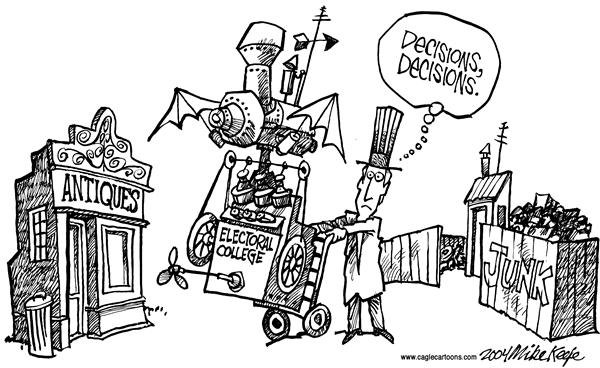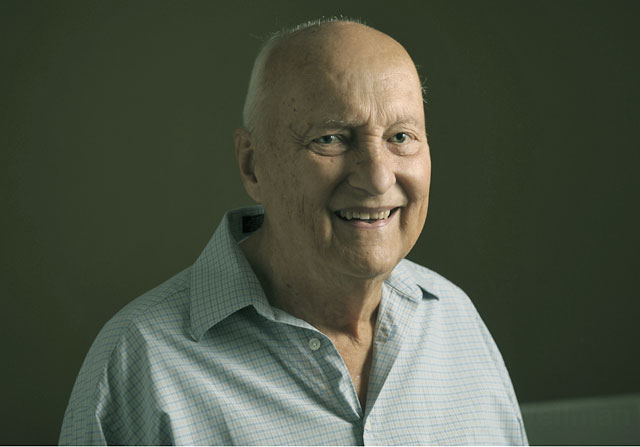Heroic Mascot-in-Chief
A Modest Proposal for Reforming the Electoral College

Do Americans want a heroic mascot as President? An imaginal embodiment of our deep values, fully charismatic and a projection of our national prestige and parental myths?
The smart money says so. Wealth buys elections. Most is paid to the info-tainment media, the ones who are supposed to give us the straight dope we need to make informed, rational judgments. The process is one of manipulation of the public’s feelings and of candidate selection by “electability qualifications” which are antithetical to our real needs, as I will explain.

But what if we adapted present forms to select a person with the actual necessary skills and attributes, plus the policy views of a majority? (Put aside, for now, that it likely won’t happen.) First, think about what you would list as the main qualifications for this mighty office, assuming the candidate shared your basic political views.
Something like this? Integrity and truthfulness, intelligence, broad life experience, emotional balance, knowledge of commerce and foreign affairs, experience in running organizations, tolerance for a range of viewpoints. Commitment to protection of minorities of all types; not being beholden to big campaign contributors; ability to listen, learn, and communicate; empathy and concern, such as for working and older people. Etcetera.
Turn now to a candidate’s electability qualifications in realpolitik in this decaying rogue state, the USA, based on the facts of recent history: Ability to pretend to believe the manipulative agenda their handlers give them, willingness to avoid discussing issues perceived as not popular, giving policy answers carefully calculated to appeal but with the secret intention to do no such thing, appearing as a heroic charismatic figure, full understanding that they won’t be re-elected if they don’t please big campaign contributors, coming from the right part of the nation, being able to prove they didn’t inhale marijuana and never strayed from the marital bed, being of the right race, gender, or ethnicity, etc.
In this system, voters have the illusion of potency once every four years, even though they are manipulated by clever media campaigns and must choose a horse from the electability stable, which only has horses that are obedient to power and know who’s really boss.
What to do? Could we trade our quadrennial gesture of mythic efficacy for a process that would give us an actually qualified chief executive, whose views reflected voter majority policy?
As it is now, the Electoral College is an anachronism and can lead to peculiar results. A modest proposal for a Constitutional amendment to retain but change the Electoral College to give the public more control:
Electors could be elected by the voters in every state based on their publicly demonstrated and debated policy views. Here is where each voter’s basic political values would be expressed. The voter gives up the former illusion of mass-vote potency in exchange for real local choice, based on her or his values, in an informed and contested local arena.
Such an amendment can also bring a kind of proportional representation to the contest by giving each elector one independent vote in the College, no matter how other electors from that state vote. (In other words, abolish the Unit Rule, where a majority of a state’s voters get all the electoral votes.)
These electors then would meet and review the record, experience, and character of candidates and have extensive, publicly broadcast hearings and reports distributed to the public. (Electors will, for example, question candidates in detail on their policies as affected by religious doctrines declared by those candidates.) Then, in open session, electors choose the president by roll-call votes, being free to avoid all the ills above, and to seek qualities and experience in the other list.
Will we still have the present “electability” problems? The list:
The manipulative agenda that works by media hype would not help the candidate, who instead has to face informed electors, who know what the candidate has or hasn’t done and what policy values the candidate has demonstrated in prior public life.
Important issues perceived as not broadly popular would very likely be brought forth by some electors because of the broad range of electors, selected on their policy histories by voters of all stripes.
Giving calculating answers will be less likely because of probing questions to each candidate and inquiry concerning their background, skills, and policy history.
Appearing as a heroic charismatic figure is irrelevant to the needs and qualities listed and of far less impact on electors chosen for demonstrated concern for policy issues.
Pleasing big campaign contributors cannot happen because there won’t be any. Zip. The shortened presidential campaigns will be entirely publicly funded. Equal broadcast time will be free.
Present law already “requires” that airwaves broadcasters (not cable or satellite) operate “in the public interest, convenience, and necessity” because the public “owns” the airwaves. This will finally become real and enforceable under the terms of the new law, so that local voters at last will receive ample information and every view on policy questions – over the air, on the Internet, and in writing.
The whole process will make the policy-based votes for electors very informed and meaningful, and then make electors’ hearings open and transparent. (If electors themselves seek election the next time around, they will have to answer to an informed public.)
Having the right locality, race, gender, and ethnicity status will matter far less since the Electoral College vote is not based on mass appeal as a diversion from policy issues. Experience of a candidate will be evaluated by electors, of course, including pertinent aspects of these status categories. (If “voters” were redefined to include all adult residents, not just citizens, as exists elsewhere, we can be sure that electors and candidates would represent a still broader range.)
Being able to prove they didn’t inhale marijuana and never strayed from a marital bed. In our “good” list, character and integrity matter a lot. But minor transgressions by a good person are not synonymous with bad character. The policy-driven new process looks at the whole political candidate, but not as a candidate for sainthood. So the chief executive candidate will not need to be an heroic, charismatic wish-projection without known flaws.
In sum: Indirect election of the president thus can give more effect to each voter’s participation – trusting them more – than now under the media-manipulated system which mostly reflects policies of big economic power and only gives voters choice among mythic mascots, those anointed by the rich and establishment-oriented.
Finally, note that this Modest Proposal:
_Radically sidesteps the dominant influence of big political parties, leaving them free to propose candidates but removing their exclusive control of candidate selection and, especially, their big-money role. (The electors, not dependent on party power and money, might even recruit candidates.) Other elections are, sadly, not affected.
_Crucially, is left-right policy neutral (and religion neutral) in structure (popular election of electors) so that it could receive public support across the political board, except that it
_Drastically reduces – but certainly does not remove – the influence of big economic power, if only in presidential selection. (Hmmm. Maybe the Constitutional amendment could be broader and get rid of capitalism? Another day.)
Come to a friendly informal discussion – all ideas on the table – thinking about the politically improbable as a way of approaching the possible, at Elsie’s on De la Guerra, on Thursday, October 18, 5 p.m.



